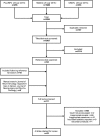Health-related quality of life and psychological functioning in patients with primary malignant brain tumors: a systematic review of clinical, demographic and mental health factors
- PMID: 31386034
- PMCID: PMC6657394
- DOI: 10.1093/nop/npv042
Health-related quality of life and psychological functioning in patients with primary malignant brain tumors: a systematic review of clinical, demographic and mental health factors
Abstract
Background: The impact of primary malignant brain tumors on patient quality of life and psychological functioning is poorly understood, limiting the development of an evidence base for supportive interventions. We conducted a thorough systematic review and quality appraisal of the relevant literature to identify correlates of health-related quality of life (HRQoL) and psychological functioning (depression, anxiety and distress) in adults with primary malignant brain tumors.
Method: Twenty-three articles met predefined inclusion criteria from a pool of peer-reviewed literature published between January 1984 and July 2015 (N = 2407). Methodological quality of included studies was assessed using an adapted version of the Newcastle-Ottawa Scale.
Results: The overall methodological quality of the literature was moderate. Factors relating consistently with HRQoL and/or psychological functioning were cognitive impairment, corticosteroid use, current or previous mental health difficulties, fatigue, functional impairment, performance status and motor impairment.
Conclusions: Practitioners should remain alert to the presence of these factors as they may indicate patients at greater risk of poor HRQoL and psychological functioning. Attention should be directed towards improving patients' psychological functioning and maximizing functional independence to promote HRQoL. We outline several areas of future research with emphasis on improved methodological rigor.
Keywords: anxiety; depression; distress; health-related quality of life; primary malignant brain tumors.
Figures
References
Publication types
LinkOut - more resources
Full Text Sources
Other Literature Sources
Miscellaneous


